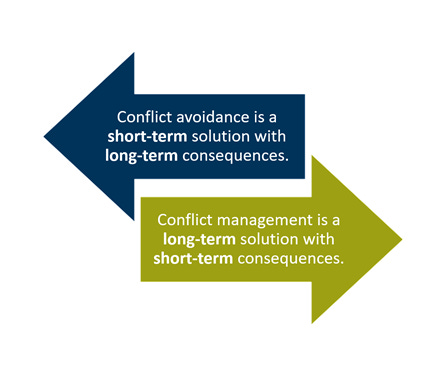Dealing with Difficult Confrontations Even if You Hate Conflict
This has been something I've struggled with my entire life. Before I went to Hargrave as a teen, I was always in a fight. All I needed was a spark. I didn't understand how to properly handle confrontation on a civil level. In the mid-nineties, I fought a guy at a traffic light and left him in the street because of a road rage incident. I lost my first restaurant job because I fought the chef. I loved conflict but didn't handle it the right way...ever. My emotions were always tied to it, which is the worst thing you can do.
Managing human resources and motor carriers in general is one thing. It's different to manage drivers and the conflicts that can arise between and amongst them or between them and the company or even customers. Resolving conflict often requires some level of politics, especially when confronting difficult situations or individuals. While some individuals may thrive on confrontation and conflict resolution, others find it uncomfortable or even anxiety-inducing. It is essential to master the art of dealing with these challenges through effective communication, even if you hate conflict. Drivers especially want you to be straight with them, so just put it out, say what you need, and get it over with.
Effective communication is the foundation of successful conflict resolution. When dealing with brutal confrontations, it's crucial to remember that your goal is not to "win" an argument but to find a solution or resolution that benefits all parties involved. Effective communication fosters understanding, promotes collaboration, and improves outcomes.
Critical Strategies for Confrontations:
Not even a bullet point. Start with mutual respect, and DON'T BE A $@%#.
Before entering into a difficult conversation, take some time to prepare and plan. This includes:
a. Understand what you want to achieve from the conversation.
b. Ensure you have all the facts and details related to the issue.
c. Try to put yourself in the other person's shoes to gain insight.
Timing and environment play a significant role in the success of a difficult conversation. You can find a private and neutral location for a focused conversation without interruptions. Timing-wise, choose a time when both parties are calm and receptive.
Effective communication involves not just speaking but also listening. Give the other person your full attention, and let them express their thoughts and feelings. Avoid interrupting or jumping to conclusions. You can create a more open and productive atmosphere by showing empathy and understanding.
Use "I" statements to express your thoughts and feelings when discussing the issue. For example, say, "I felt concerned when I saw the safety report," rather than "You always neglect safety regulations." This approach makes your perspective less accusatory and more about your feelings and concerns.
I suck at this part. Even if you hate conflict, keeping your emotions in check during a difficult conversation is vital. Emotional outbursts or becoming defensive can escalate the situation. Practice deep breathing and self-control techniques to remain calm and composed.
Ask open-ended questions. These questions typically start with words like "what," "how," or "why" and require more than a simple yes or no answer. This helps you gain a deeper understanding of their perspective.
Look for areas of common ground during the conversation. Building on shared interests or objectives can help pave the way to a beneficial resolution.
Work collaboratively to brainstorm potential solutions. Be open to compromise and be willing to consider alternative perspectives. The goal is to find a resolution that addresses everyone's concerns.
Summarize the key points and agreements reached. Confirm the actions that each party will take moving forward. This ensures both parties leave the conversation clearly, understanding what comes next.
Even if you hate conflict, mastering this art can lead to more productive workplaces. By preparing, actively listening, and employing these strategies, you can confidently manage challenging situations and promote a culture of open communication and conflict resolution within your organization. Remember, the goal is not to avoid conflict but to manage it constructively for everyone's benefit.


